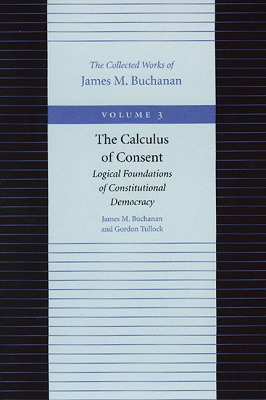The Calculus of Consent by James M. Buchanan and Gordon Tullock is one of the Great Books in the Public Choice tradition, a scholarly tradition within economics and political science that uses tools of economics–rational choice, methodological individualism, and the notion of politics as exchange–to understand political decisions. Public choice has been criticized as cynical and depressing because it (allegedly) doesn’t see people as more than hedonistic lightning calculators of pleasure and pain who would run over their own mothers to pick up a nickel on the sidewalk. Like many economic theories, it has been criticized for being “reductionistic” and for having a narrow, “atomistic” view of the detached individual. People have argued that it is evil because it advises people to act that way (spoiler alert: it doesn’t). It has been called immoral because it refuses to look at people through aspirational lenses. But then again, what should we expect from what James M. Buchanan–one of the founders of Public Choice and 1986 Nobel Laureate for public choice ideas–calls “politics without romance”?
Observers shouldn’t sell public choice theory or public choice economists short. There is more to the Public Choice tradition–and to economics more broadly–than getting and spending. Buchanan was keenly interested in ethical ideas over the course of his career, which shouldn’t be surprising given his mentor Frank Knight’s publication record. He includes a section on “Pigovian Economics and Christian Ethics” in his underappreciated book Cost and Choice. There are four entries in the index to The Calculus of Consent for “ethics” and one for “morals.”
Four of those references direct readers to Chapter 16, “Democratic Ethics and Economic Efficiency” (emphasis added), and another directs readers to a section titled “The Ethics of Pressure-Group Activity” at the end of Chapter 19. Buchanan and Tullock argue that their research agenda is optimistic rather than pessimistic because they “view collective decision-making (collective action) as a form of human activity through which mutual gains are made possible.” They continue: “Thus, in our conception, collective activity, like market activity, is a genuinely cooperative endeavor in which all parties, conceptually, stand to gain.” They contrast this against “much of orthodox political thought” which “seems to be based on the view that the collective-choice process reflects a partisan struggle in which the beneficiaries secure gains solely at the expense of the losers.” Following the economist Dennis Robertson, they argue that if their analysis is correct, “there need be less reliance on moral restraints of individuals.” In other words, we can get better political outcomes with people as we actually know them without waiting for a Great Leap Forward or a New Socialist Man.
They recognize that people have standards: some people might think labor is OK but prostitution is “grossly immoral.” Turning to economists, “(a)n economist may consider it morally acceptable to sell his educational services to a university, but morally unacceptable to sell his professional services to a political party.” A little imagination brings up a lot of other examples. We generally agree that it is OK to buy houses and apartment complexes and rent them to strangers but that it isn’t OK to present one’s child with a bill for food, clothing, and shelter. Taboo foods and forbidden words appear in almost every culture. Just because people are methodological individualists does not mean they can’t be vegan. They go on to discuss vote-trading, which, they argue, is almost universally condemned when money is involved. A student at the University of Minnesota, for example, was charged for offering to sell his vote in the 2008 election on eBay. Things are different when no money changes hands but when people take advantage of “(t)he opportunity to trade votes on separate issues through logrolling,” which, as they point out, can have some advantages insofar as it can block discriminatory legislation.
They go on to analyze arguments for and against vote-trading in different scenarios and to argue that pressure-group activity (later called rent seeking) and argue that it is “an inherent and predictable part of modern democratic process” that “is a predictable outcome of [their] fundamental behavioral assumptions.” At first, this looks depressing. However, the public choice approach gives us reasons for hope because it shifts attention from moral reform to institutional or “structural” reform. There is a great deal of fault in ourselves, but at least with respect to public choices, they can be mitigated a great deal by addressing the faults in our incentives.
Art Carden is Professor of Economics & Medical Properties Trust Fellow at Samford University, and he is by his own admission as Koched up as they come: he has an award named for Charles G. Koch in his office, he does a lot of work for and is affiliated with an array of Koch-related organizations, and he has applied for and received money from the Charles Koch Foundation to host on-campus events.



READER COMMENTS
Thomas Lee Hutcheson
Mar 2 2023 at 6:44pm
Public choice ought to offer many insights into policy making, but I seldom actually see it being applied.
nobody.really
Mar 5 2023 at 2:26pm
“Q: Mrs. Johnson, when you accompanied your boss to Houston, did you have sex with him there?
A: Absolutely not!
Q: And when you accompanied him to Phoenix, did you have sex with him there?
A: No!
Q: And when you accompanied him to St. Louis, did you have sex with him there?
A: … no comment….”
This exchange came to mind as I read this:
Nice to see Carden deny the final claim. But what does that imply about the earlier claims?
Comments are closed.